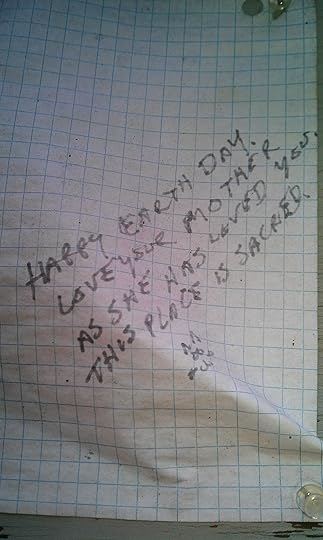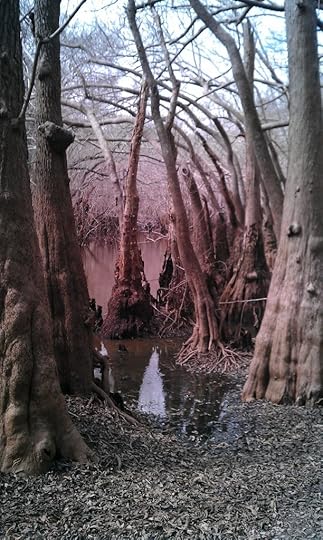Alison McGhee's Blog, page 38
March 31, 2012
Poem of the Week, by Osip Mandelstam
The Necklace
- Osip Mandelstam (1920; translated from the Russian by Christian Wiman)
Take, from my palms, for joy, for ease,
A little honey, a little sun,
That we may obey Persephone's bees.
You can't untie a boat unmoored.
Fur-shod shadows can't be heard,
Nor terror, in this life, mastered.
Love, what's left for us, and of us, is this
Living remnant, loving revenant, brief kiss
Like a bee flying completed dying hiveless
To find in the forest's heart a home,
Night's never-ending hum,
Thriving on meadowsweet, mint, and time.
Take, for all that is good, for all that is gone,
That it may lie rough and real against your collarbone,
This string of bees, that once turned honey into sun.

–
For more information on Osip Mandelstam, please click here: http://www.poets.org/poet.php/prmPID/698
–
Facebook: http://www.facebook.com/home.php?#!/pages/Alison-McGhee/119862491361265?ref=ts
March 24, 2012
Poem of the Week, by Anna Journey
Diagnosis: Birds in the Blood
- Anna Journey
The hummingbird's nervous embroidery
through beach fog by our back
patio's potato vine
reminds me of my mother's southern
drawl from the kitchen: She's flying,
flying like bird! I've heard that
as a child I involuntarily flapped my hands
at my side during moments
of intense concentration. I'd flutter
over a drawing, a doll, a blond hamster
in a shoebox maze. There are ways
to keep from breaking
apart. My guardians. My avian
blood. I believed
birds bubbled inside me—my own
diagnosis—though the doctors called it
something else: a harmless
twitch. A body's
crossed wires. The lost
birds of my childhood
nerves have never
returned. But when you held
my elbow as we walked the four
blocks to the boardwalk,
we saw the brief
dazzle of a black-
chinned hummingbird—the first
I'd ever seen. It sheened
and tried to sip
from my sizzled wrists'
vanilla perfume. I knew
a single one
from the magic
flock had finally found me.
–
For more about Anna Journey, please click here: http://en.wikipedia.org/wiki/Anna_Journey
–
Facebook: http://www.facebook.com/home.php?#!/pages/Alison-McGhee/119862491361265?ref=ts
March 16, 2012
Plan B
An acquaintance asks you if you have any words of wisdom to contribute for a talk she's giving on the topic of "Building a Writing Life."
You start to tap out a bunch of little bromides along the lines of a) make a practice of writing regularly, b) look at writing as a process rather than a series of finished projects, c) develop a good critical eye for your own work.
How dull. If you were an aspiring writer you would be at best unmoved and at most insulted by the boringness of these words of wisdom. You hit delete and abandon ship and go for a long walk with your dog.
But the frustration with your own words remains. Annie Dillard, in an essay that you've memorized because you love it so much (except for that one paragraph you hate and choose to ignore), says, "What could you say to a dying person that would not enrage by its triviality?"
You are enraging yourself –not too strong a word– by the triviality of your advice. This seems ridiculous; it's only a simple talk to aspiring writers on building a writing life, for God's sake. But the anger remains.
Now you're thinking about a workshop you taught last fall, in which the writers were talking about this very thing. How to become a writer. How to make a life as an artist, whatever that art form –painting, writing, music, acting– might be. The difficulty of making a living, even a small living, as an artist.
You listened to them talking. Everything they said was true. There was nothing to disagree with. The conversation shifted to Plan B, the backup plan for when things don't go the way you want them to.
"Screw Plan B!" one of them said. "It seems to me that if you have a Plan B you're going to end up following Plan B and be guaranteed failure. Why not go for Plan A and at least know you tried?"
You looked at this writer. He is a person of strong opinions and enormous talent, and behind that talent is a ferocious determination. He was laughing, as he often is, but you knew he was dead serious.
"I never had a Plan B," you heard yourself say, and you realized only then that it was true.
This was a weird thing for you to say, because you don't much like to talk in class, or anywhere for that matter, about your own writing.
But you felt as if little puzzle pieces were all falling into place. Was it possible that you hadn't realized until that moment that you were a Plan A-only type of person?
Yes. It was possible. You knew that from early on you wanted only to write a book, a beautiful book, but the fact that this was and remains your only goal felt like new information.
In that same moment, sitting there in class listening to your students, you realized that life is easier if you only have a Plan A. It makes prioritizing easy. Whatever you want to be, to do, whether it's write a beautiful book or paint an astonishing painting, means that the book or the painting will always be the highest priority.
First comes the Plan A, then comes everything else. Whatever job you take to support the plan will be secondary to the plan. If you have children you'll figure out how to keep writing when you have them. Maybe you'll get up at 4, maybe you'll stay up until 4. Somehow you'll figure it out.
Even if you're not a good writer –and you yourself weren't– that won't stop you. You'll keep at it until you slowly get better. Because what other choice do you have? There's nothing to fall back on, if you have no Plan B.
"Easy for you to say," someone once said to you, after you told her you were pretty sure you would be writing even if you never published anything, "because you have published things."
That kind of remark makes you go instantly quiet. It seems so rude to respond to it, to repeat that no, you're pretty sure you'd be writing anyway. And the further truth, which is that you never think about the things you've published, also seems rude.
But it's the truth. Anything published is behind you, and you only look ahead. All you want is to write that beautiful book, and it's still out there. You haven't done it yet. That book is waiting for you.
This –the fact that you have not yet accomplished your goal– also makes life easier. You don't have to look around and think, Now what? You don't have to try to come up with a new plan because the first plan is still operational. It's a dream that's still being realized.
It's a dream that might never be realized. This, too, is something that hadn't occurred to you. You've been like a shark, always swimming forward.
All this time you thought there was an end goal, didn't you? That beautiful book out there, shimmering in the distance, waiting for you to write it. But what if the beautiful book is a mirage?
It comes to you now, finally, that the beautiful book is a mirage.
That this doesn't bother you must mean something, but you'll have to think on it for a while.
March 9, 2012
Another Picture Book Writing Workshop, Saturday, April 7
Greetings, writers!
Any of you picture book writers out there still feeling isolated? I'm offering another one-day picture book manuscript workshop on Saturday, April 7.
We'll talk about the fascinating/fiendish (take your pick) specific challenges of writing these fabulous little books, including the essential elements of picture book writing: characters, story arc, language, beginnings and endings, voice and tension.
If you wish, you can bring in copies of a manuscript of your own (no more than 400 words) and we'll read it aloud and discuss it. Or, just come and absorb whatever's useful to you and your current or future work. Workshop is limited to a maximum of eleven.
Date: Saturday, April 7, 12:30-4:30 p.m.
Place: my house in Uptown Minneapolis.
Cost: $50 (payable by check or Paypal), including hand-outs and some kind of tasty homemade treat. Please email me at alison_mcghee@hotmail.com if you have questions or would like to sign up, and please feel free to forward this notice to any interested friends.
March 3, 2012
Poem of the Week, by D.A. Powell
Outside Thermalito
- D.A. Powell
Persimmons ripen with the first frost.
The bitterness inflicted on them
takes their bitterness away.
Would that there were some other way.

–
For more information on D.A. Powell, please click here: http://www.poetryfoundation.org/bio/da-powell
–
Facebook: http://www.facebook.com/home.php?#!/pages/Alison-McGhee/119862491361265?ref=ts
Blog: alisonmcghee.com/blog
February 27, 2012
You Who Pull the Oars
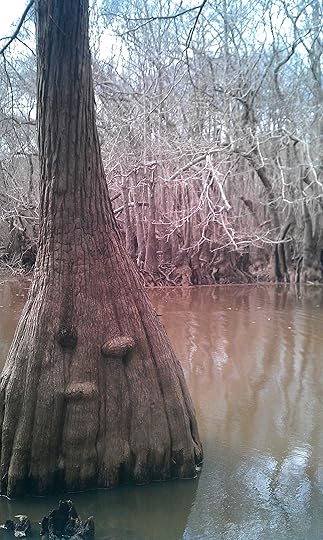 You and your friend Absalom are keeping your ears open for stories. You're open to anything, on this particular weekend, when you're thousands of miles away from the north country where you grew up, the north country where the funeral of a friend is taking place without you.
You and your friend Absalom are keeping your ears open for stories. You're open to anything, on this particular weekend, when you're thousands of miles away from the north country where you grew up, the north country where the funeral of a friend is taking place without you.
You've got a notecard stuck in your back pocket, a card that contains a letter describing the kind of person your friend was, a check from you and some folding money from Absalom, gifts in honor of that friend and his wife that you decide should be given to someone neither of you have yet met but will, at some point today.
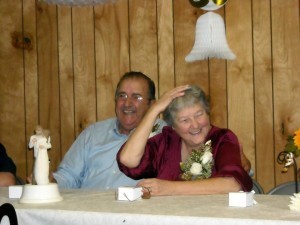 The two of you get in the car and drive the 22 miles into the nearest town, which is tiny, contained in the curves of the bay. On the way in –straight shot on a road surrounded with sand and pine barrens– you tell Absalom that your friend was a busy man, with places to go and things to do and people to see.
The two of you get in the car and drive the 22 miles into the nearest town, which is tiny, contained in the curves of the bay. On the way in –straight shot on a road surrounded with sand and pine barrens– you tell Absalom that your friend was a busy man, with places to go and things to do and people to see.
"But the thing is, you wouldn't know it," you say. "When you were with him, you felt as if he had all the time in the world for you."
You decide to live, for at least this weekend, as if you have all the time in the world for whoever you find yourself with.
Absalom puts down his window and you do the same. You roll slowly up and down the back streets of the town until you find an old cemetery, where the gravestones are hundreds of years old, half-toppled marble, almost illegible. You and Absalom wander among the gravestones, which go back to the Civil War.
Across from the graveyard is a community garden: raised beds full of feathery-topped carrots and onions and sugar snap peas and spinach and chard. So green, so lush. You and Absalom wander among them. You resist the urge to steal some sugar snap peas.
"Look," you say to Absalom. "If someone doesn't pick these they're going to get fibrous and nasty."
You'd be doing the gardener a favor by stealing these snap peas. The only thing that keeps you from thievery is the lone gardener weeding his raised bed a few yards away
Faint music reaches your ears. It's the annual Black History Festival here in this tiny town, held in a little park on this day of overhanging clouds and threatening rain. You and Absalom get back in the car and meander your way over.
"Welcome," says someone standing at an entrance gate made out of orange plastic honeycomb fencing. "Welcome."
"How you doin," says someone else.
Unlike other years when you've come to this festival, you and Absalom are not the only white people here, which strikes you as a good thing. You talk about the times in your lives when you have been the only white people, not that there have been many of them. They're memorable though, because you were so aware of it.
Absalom is hungry and so are you. Shrimp? Ribs? Homemade corn dogs? Fresh fudge? Shrimp and beans and coleslaw for you and a barbecue sandwich for Absalom.  You sit on the bleachers eating, surrounded by members of the Mt. Zion Missionary Baptist Church, who are all wearing red t-shirts and nodding in response to a girl onstage with a microphone, urging the crowd to be unique, to know how beautiful and individual each one of you are.
You sit on the bleachers eating, surrounded by members of the Mt. Zion Missionary Baptist Church, who are all wearing red t-shirts and nodding in response to a girl onstage with a microphone, urging the crowd to be unique, to know how beautiful and individual each one of you are.
You make fun of Absalom's "sandwich," which is a giant slab of ribs with a piece of Wonder Bread tossed on top. He makes fun of the way you eat, which is one thing at a time, the way God intended food to be eaten.
The girl with the microphone steps off stage and the Tallahassee High Steppers take her place, three of them, moving in a choreographed dance. Their white belts flash as they step and sway back and forth.
You and Absalom clamber off the bleachers and wander some more. It's a tiny festival, relaxed and slow and full of smiling people chatting in little clumps. The notecard is still in your back pocket. You walk up to one of the red-shirted Mt. Zion congregants. He's a tall, gentle-looking man. He smiles at you and you smile back.
"Are you the pastor of Mt. Zion?" you ask him.
"No ma'am," he says. "But the pastor will be here soon. He's setting up for our gospel choir. Y'all should stay around until we perform. One o'clock."
You and Absalom are both fans of gospel music. You look at each other and communicate silently. Yes, one o'clock will work just fine.
"We're small, but the pastor brings out the big in us," the man says.
He shakes your hand, and then he shakes Absalom's hand. You wish you were as gentle and generous as this man is.
At one o'clock you and Absalom climb back up onto the rickety bleacher and listen to the Mt. Zion gospel singers. There's the pastor off to the side, playing the keyboard and calling out for a response and directing, all at the same time. The gentle tall man in the red shirt was right: they're small, but they're loud.
When they're finished, you pull the sealed notecard out of your pocket and you and Absalom go in search of the pastor, who's already folded up his keyboard and is lugging it back to the trunk of his car.
"Pastor?"
He turns and looks you up and down and says nothing, but nods. He's a little wary.
"This is for you and your church," you say, and hand him the notecard.
He still doesn't quite know what to make of you, but you thank him for the gospel performance and then shake his hand.
Later, you and Absalom get in the car and drive out of town onto the unmarked sand roads that branch onto and off the river from which the town and the bay take their name. The headwaters of this river are in the Appalachian Mountains, far north of Atlanta, and it gathers itself as it flows south, becoming a wide, brown, slow-moving river that eventually empties into the bay. This bay and its estuarial waters produce 90% of the oysters eaten in Florida and 13% of the oysters eaten nationwide.
Absalom and you are in search of what are known in these parts as fish camps, places where people who want to disappear from the world can disappear into. You're in the mood to disappear from the world for a little while, and Absalom, adventuresome soul that he is, is perfectly willing to go along with this.
"See, this is the kind of thing that he would do," you tell him, speaking of your friend whose up north funeral it is today. "He was always calling up my dad and telling him things like, 'I heard a rumor that the largest cat in the world lives three hours away, are you in for the ride?'"
Yes. Your dad was always in for the ride. Back they would come, laughing, full of stories to tell.
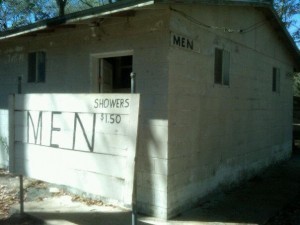 Absalom and you wander the back roads until you find your way to a fish camp where a man can take a shower for $1.50. (Women? Good question.)
Absalom and you wander the back roads until you find your way to a fish camp where a man can take a shower for $1.50. (Women? Good question.)
Beyond the fish camp is a boat landing: dark clear water, old motorboats tied to the dock, chain-link boxes half-submerged in the water. You don't know what those boxes are for, and you ask an older man with carefully-combed silver hair what they are.
"Those? You can put your fish in there if you caught too many to hold in your bucket but you want to keep on fishing," he says.
You wonder what kind of fish can be caught here.
"Anything," he says. "Catfish, mostly. Bass, too. All kinds of fish. Sometimes a bull shark if the tide is high and the river turns salty."
He eyes you and Absalom.He knows by your accent alone that you're not from around here.
"Where you folks from?"
You tell him. He nods. He tells you more about the river. He was born and raised here. Joined the army and spent a lot of years living all over the place, then retired and came back here. He has a camp up the river.
"You can only get there by boat," he says. "There's electricity, but that's it."
"No roads?" Absalom says.
He shakes his head. "I go up there for three-four weeks at a time," he says.
You tell him that you would do the exact same thing, which is true. The older you get the more you want to disappear, for three-four weeks at a time. Longer even. Unplug. Retreat. Live in silence for a while.
Suddenly he gestures to his boat, an old green boat with a motor hanging off the end.
"Climb in," he says to you and Absalom. "I'm going to take you upriver."
You and Absalom climb in. You're going upriver. One hand on the tiller, the other pointing here and there, the silver-haired man shows you the river. He tells you about cypress trees, ancient and permanent, how the stumps you see here and there were probably cut 100 years ago, but that cypress doesn't rot. He points out cypress knees to you, roots pushing up above the loamy ground so that the tree gets enough air. Those other things, the ones that look like stalagmites? Those are new cypress growing up out of the roots of the old ones. And those other trees, they're sweet gum. You should see this river about a month from now, he tells you; you won't believe how beautiful it is right about then.
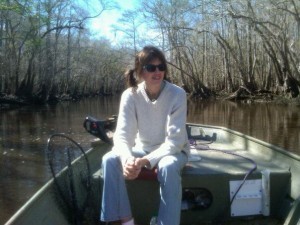 You and Absalom sit quietly and listen. Here and there along the wide brown river, on either side, are old houseboats tied to trees with long ropes. Camps hauled in by boat, one load at a time, and built right there on the banks of this ancient river. This is a place you could go to disappear.
You and Absalom sit quietly and listen. Here and there along the wide brown river, on either side, are old houseboats tied to trees with long ropes. Camps hauled in by boat, one load at a time, and built right there on the banks of this ancient river. This is a place you could go to disappear.
When he brings you back to the dock he shakes your hands and tells you to give him a call next year; he'll take you out and show you some more. You promise to do that.
As you and Absalom are leaving, another boat comes putting up to the dock. In it are three older men that, you swear, could be transplanted to the diner you grew up eating in. You can see yourself sitting in a booth with those three fishermen and your father, trading stories.
When Absalom stops to take a picture of the $1.50 shower you close your eyes for a second and send the image of those men to your dead friend. He would have loved this adventure. He would have climbed right into that boat and stayed out on the river all day.
On the way out of the fish camp you and Absalom spot another cemetery, up on a bluff, nearly invisible. You would have missed it entirely if you hadn't raised your eyes at just the right moment. Out you go, to wander around.
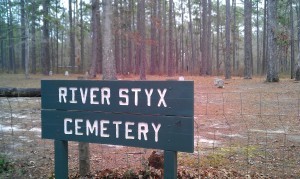 Of all the headstones, maybe twenty, in this tiny cemetery, only one has a name on it. All the others are nameless, unengraved. Blank headstones to mark a life once lived, by someone who wanted anonymity.
Of all the headstones, maybe twenty, in this tiny cemetery, only one has a name on it. All the others are nameless, unengraved. Blank headstones to mark a life once lived, by someone who wanted anonymity.
Unlike the souls buried in this sandy patch of land, next to this dark river, it wouldn't have been your friend up north's wish to disappear.
But he would have walked this cemetery with you. He would have said a prayer for those buried within it.
* * *
Charon
You who pull the oars, who meet the dead,
who leave them at the other bank, and glide
across the reedy marsh, please take
my boy's hand as he climbs into the dark hull.
Look. The sandals trip him, and you see,
he is afraid to step there barefoot.
ZONAS, 1st century B.C.E. (translated by Brooks Haxton)
February 25, 2012
Poem of the Week, by Philip Levine
You Can Have It
- Philip Levine
My brother comes home from work
and climbs the stairs to our room.
I can hear the bed groan and his shoes drop
one by one. You can have it, he says.
The moonlight streams in the window
and his unshaven face is whitened
like the face of the moon. He will sleep
long after noon and waken to find me gone.
Thirty years will pass before I remember
that moment when suddenly I knew each man
has one brother who dies when he sleeps
and sleeps when he rises to face this life,
and that together they are only one man
sharing a heart that always labors, hands
yellowed and cracked, a mouth that gasps
for breath and asks, Am I gonna make it?
All night at the ice plant he had fed
the chute its silvery blocks, and then I
stacked cases of orange soda for the children
of Kentucky, one gray boxcar at a time
with always two more waiting. We were twenty
for such a short time and always in
the wrong clothes, crusted with dirt
and sweat. I think now we were never twenty.
In 1948 in the city of Detroit, founded
by de la Mothe Cadillac for the distant purposes
of Henry Ford, no one wakened or died,
no one walked the streets or stoked a furnace,
for there was no such year, and now
that year has fallen off all the old newspapers,
calendars, doctors' appointments, bonds,
wedding certificates, drivers licenses.
The city slept. The snow turned to ice.
The ice to standing pools or rivers
racing in the gutters. Then bright grass rose
between the thousands of cracked squares,
and that grass died. I give you back 1948.
I give you all the years from then
to the coming one. Give me back the moon
with its frail light falling across a face.
Give me back my young brother, hard
and furious, with wide shoulders and a curse
for God and burning eyes that look upon
all creation and say, You can have it.

–
For more information on Philip Levine, please click here: http://www.poetryfoundation.org/bio/philip-levine
–
Facebook: http://www.facebook.com/home.php?#!/pages/Alison-McGhee/119862491361265?ref=ts
February 22, 2012
Three Small Conversations from the River
You and your old friend, a friend of thirty years' standing, get in the car and open the windows and put on the music –Etta, Nina, Tina– and drive to the primeval river seeking its wide brown waters and everything held within and without: the cypress rising like sentries on either side, the sweet gum trees, the scrubby pines.
Your friend had spent the weekend hoping to see an alligator, something he'd never seen in the wild, and his hope became yours too. It had been a weekend of adventuring up and down the unmarked sandy offshoots of the river, finding the fish camps into which, if you were a person who wanted to disappear from the world, you could haul the shell of an old camper or school bus and put it up on cinder blocks and do just that.
You'd seen pods of pelicans and pods of dolphins in the ocean and, here by the river, either an eagle or a hawk trying to scare another eagle out of its high, silent orbit. You'd seen snakes in the water and the skeletons of unknown animals littering the banks of the river. As the sky grew light at dawn you'd looked out the window and seen the elegant droop of a sleeping peacock on the high branch of a high tree across the road.
The day before you had rambled through an old campground in search of the two-headed palm that was said to grow there, and you saw that too. 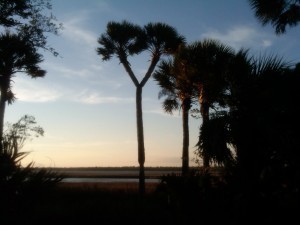 Your friend had brought two fine cigars down with him and you stood at the entrance to the campground and smoked them and took photos of each other smoking them.
Your friend had brought two fine cigars down with him and you stood at the entrance to the campground and smoked them and took photos of each other smoking them.
Now you were back in the car and traversing the byways, seeking out boat landings and fish camps and the denizens of the river, both animal and human.
* * *
"If I write you into the story, do you want me to use your real name or your nickname?" you say to your friend.
"If you write me into the story you may refer to me as Absalom," he says.
* * *
You and Absalom are sitting on the concrete piling of a boat landing at Howard's Landing. The sun beats down. The river is wide here, dark and placid, bending its way around a far curve lined with sweetgum trees, dotted with the occasional rowboat.
You watch the two closest to you. Each holds a fisherwoman wearing the kind of hat that you used to see on the heads of field workers in China. They are calling to each other, a slow, lazy conversation that winds and curves like the river.
"Every mornin I praise the man in Jesus," says one.
"As Jesus is in the man, I praise him too," says the other.
"I'm not phrasin it right–"
"–I know what you mean."
(Pause.)
"Sing it," says one. "Sing that song about the road."
"What song?"
"That road song."
"I don't know it."
"You know it," says the first, and begins to sing: On the road again. . .
"Oh yeah. I know it. Skinny long ponytail down the back man."
"Tha's right. Sing it."
(Pause.)
"Y'all got any wuthwhile crickets over there?"
(Pause.)
"They's some crickets here but they's not too lively."
"I got to bail this river out of my boat then I'll be over."
* * *
Back in the car, windows open, Gear Daddies singing about a summer kind of sad. Dusty, sand-rutted road lined with pines. Why are none of these landings marked? Never mind, you know why. Places people go to disappear aren't usually well-marked.
A car approaches from around a bend. You frown and glance over at Absalom. He's also frowning. You know exactly what's on his mind.
"Look at that car," he says.
"I know."
"It's not right."
"I know," you say again. "We should be the only car on the road."
(Pause.)
"It doesn't take long, does it, Absalom?"
"You mean to get used to being away from everything?" Absalom says. "To being the only car on the road? To the silence and the solitude and the slowness?"
"Yeah," you say.
"No," he says. "It doesn't take long at all. It's surprising just how little time it takes."
* * *
February 18, 2012
Poem of the Week, by W.H. Auden
Funeral Blues
- W.H. Auden
Stop all the clocks, cut off the telephone,
Prevent the dog from barking with a juicy bone,
Silence the pianos and with muffled drum
Bring out the coffin, let the mourners come.
Let aeroplanes circle moaning overhead
Scribbling on the sky the message He Is Dead,
Put crepe bows round the white necks of the public doves,
Let the traffic policemen wear black cotton gloves.
He was my North, my South, my East and West,
My working week and my Sunday rest,
My noon, my midnight, my talk, my song;
I thought that love would last for ever: I was wrong.
The stars are not wanted now: put out every one;
Pack up the moon and dismantle the sun;
Pour away the ocean and sweep up the wood.
For nothing now can ever come to any good.

–
For more information on W.H. Auden, please click here: http://www.poets.org/poet.php/prmPID/120
–
Facebook: http://www.facebook.com/home.php?#!/pages/Alison-McGhee/119862491361265?ref=ts
February 16, 2012
What Was Really Happening
Late last night you drove three hours in deep darkness on the highways and then byways of a nearly-forgotten southern coast.
What was really happening was that you were thinking about another trip you took at the tail end of last summer. One of your youthful companions was with you, the middle one. Her belongings were jigsaw-puzzled into the trunk and the back seat.
She sat in the passenger seat, or rather she reclined in the passenger seat, and slept. She slept almost the entire way, over a thousand miles, as you piloted the rental car through the highways and byways of Minnesota and Wisconsin.
On the car ferry that crosses Lake Michigan the two of you made your way to the top deck and dragged lounge chairs over to the side. She reclined hers fully and fell asleep for most of the four-hour journey across that vast lake, waking up when you pressed half of a giant chocolate chip cookie into her hand.
Once in the car again, on the other side, she fell asleep again while you drove through the vast forests and hills of Michigan, a remote and, in your opinion, highly underrated state. When you crossed over into Canada –blessings on Canada, that vast and beautiful country– she fell asleep again.
She came awake when you spontaneously steered the car toward Niagara Falls –where you hadn't been since you were a child– and the two of you got out and walked the length of the stone-walled path, cooled and softened by the ever-present mist rising from those enormous falls.
"Why am I sleeping so much on this trip?" she said.
"You're tired," you said. "It's been a busy summer."
She nodded. It had been a busy summer. Travel and socializing and working, all busy things, things that could tire a person out, but not so much when you're her age.
One of the things that was really happening was that she had spent the summer not thinking about what was coming at the end of it, which was this long trip that was carrying her away from the city of her birth, the city she loved. That was carrying her away from the place that held her childhood.
But here she was, and here you were, getting back in the car for the final few hours of the trip which would bring her to a new place, where you would leave her. You decided to say something true.
"You're sleeping so much because I'm driving and you feel safe because your mother's taking care of you and it reminds you of being a little girl, so you let go and you fall asleep," you said.
She smiled. There were only a few hours left to this trip and she didn't fall asleep again. It was too late now not to think about what was to come, all the newness, all the unfamiliar people, all her friends back home.
All her friends weren't back home, not really. They too were dispersing, if not to places a thousand miles distant then to places closer. But still: different. Different places. New places. New lives.
The thing that was really, truly happening was that she knew, fundamentally, that the life she had lived up until now was over. Still part of her, as it would always be, but over.
You glanced at her, gazing out the passenger window. She was the second of your three youthful companions. Her brother had two years of being the only one, before she was born. Her sister would have three years of being the only one, now that she was leaving. She was the only one who had never had a single stretch of time with just you.
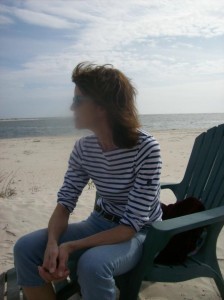 For some reason this had never occurred to you before, and as you watched her looking quietly out the window at the woods and lakes of upstate New York, the knowledge smote your heart.
For some reason this had never occurred to you before, and as you watched her looking quietly out the window at the woods and lakes of upstate New York, the knowledge smote your heart.
Something else you knew but didn't say was that she slept so much on that trip because what was to come was inevitable. There was nothing she could do, at this point, to prevent it.
Choosing where to go to college, whether to go to college, who you'll live with when you're there –none of these decisions were the catalysts of the change she was facing. Time was. The simple fact of years, years that go by, that ferry a person from one stage of life to another.
Sometimes you're aware that it's happening, other times it just happens.
There have only been a few times when you yourself weren't trying to influence the outcome of something in your own life. When you weren't striving for something, urging yourself on, making lists, working on something that would not see completion for a long time, if ever.
What all this busy-ness means, ultimately, is that you count on there being a future. You count on there being days and weeks and years ahead of you. How often has it happened that you just. . . stop? Shut down the planning, the thinking?
Rarely. Almost never. Two times come to mind.
The first: you were a child, riding in the back seat of the station wagon with your sisters. Your mother was driving. It was winter in upstate New York: snow and wind and black ice on the road. The car began to slide. It was sliding sideways and you were looking out the window and you knew it was going to slide right into the ditch, right into that wall of snow on the side of the hill.
There was nothing you could do. You let go and let it happen.
The second: about an hour after that girl, the one looking out the windo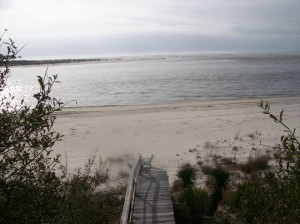 w on the final leg of the thousand-mile journey, was born. She was a long time coming, like her brother before her, and by the time she was clean and swaddled you were so exhausted you couldn't speak.
w on the final leg of the thousand-mile journey, was born. She was a long time coming, like her brother before her, and by the time she was clean and swaddled you were so exhausted you couldn't speak.
When everyone was gone –the nurses, her father, the silent smiling man who brought you a plate of supper– there was only one lamp lit in the room.
It was night. It was winter. She was sleeping in a plastic-walled box on wheels next to you.
You don't know why you turned on the t.v., but you did, muting the sound. There on the screen, bombs were falling on a distant country. Your country was bombing another country. You had brought another human being into a world full of bombs and violence and terror.
For the first and only time you can remember, this didn't matter to you. You didn't start planning and worrying and shaking your head.
Here was a quiet room, a lamp, a sleeping baby, a plate that held baked chicken and green beans and buttered toast. You let go and let it happen.
Then you closed your eyes and went to sleep.
In the end, is this the way it is? From one life into whatever, if anything, comes next, does there come that sleep? That letting go?
Between two unknowns, I live my life.
Between my mother's hopes, older than I am
by coming before me, and my child's wishes, older than I am
by outliving me. And what's it like?
Is it a door, and good-bye on either side?
A window, and eternity on either side?
Yes, and a little singing between two great rests.
(excerpt from "The Hammock," by Li-Young Lee)

